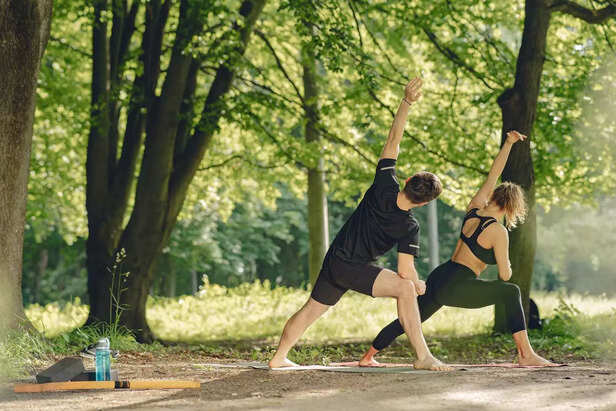Do we need gym to be healthy? Finding the Best Path to Fitness
Amritansh Nayak | Aug 12, 2025, 07:00 IST
( Image credit : Timeslife )
True health is more than just muscles and gym memberships; it includes physical fitness, emotional well-being, balanced nutrition, adequate sleep, and stress management. Whether through gym workouts, home exercises, or outdoor activities, constant activity and good behaviors lead to long-term wellness without relying primarily on expensive fitness facilities.
When people think about fitness, they frequently envision rows of machines, hefty weights, and sweaty workouts. While gyms provide useful tools, they are not the only way to achieve good health. True well-being is a combination of physical activity, healthy diet, enough relaxation, and mental harmony. Many alternatives, ranging from home workouts to outdoor sports, can produce similar or greater outcomes. By concentrating on sustainable habits and joyful movement, you can attain long-term health without relying entirely on a gym membership. It's about consistency, balance, and figuring out what works best for you.

When most people think of "being healthy," they generally envision toned muscles, intensive workouts, and hours at the gym. While physical fitness is a vital part of health, real well-being extends far beyond appearance and workout regimens. Health is a condition of equilibrium in the body, mind, and lifestyle—a state in which you feel energized, resilient, and psychologically calm. Physical fitness certainly have a role, but it is only one part of the issue. Mental well-being is as important; stress management, emotional stability, and a positive outlook have a direct impact on your entire health. Another good indicator is your energy levels during the day—if you can go about your everyday tasks without feeling tired all the time, your body is working properly.
Immunity is another important aspect. A healthy body is better able to combat sickness and recover rapidly. This is determined not only by physical activity, but also by nutrition, sleep quality, and lifestyle choices. Finally, true health entails living a balanced lifestyle—nourishing your body with the correct foods, exercising regularly, getting enough rest, and caring for your mental health. To attain this balance, you do not need an expensive gym membership; instead, you must develop habits that will support both your body and mind in the long run.

Many people feel that being active necessitates a gym membership, but there are other ways to maintain good health without visiting a fitness club. The key is movement—regular, pleasurable activities that keep your body engaged and robust. Home workouts are among the most accessible possibilities. Simple bodyweight workouts such as push-ups, squats, planks, and lunges can help you gain strength without using any equipment. Yoga, too, provides both physical and emotional advantages, like improved flexibility, balance, and stress levels from the comfort of your own living room. Outdoor activities can be as effective.
Walking, running, or cycling in the park not only improves cardiovascular health, but it also gives fresh air and sunlight, which are essential for mood and immunity. Sports such as badminton, football, and swimming make fitness enjoyable rather than a job. Even minor, ordinary movements count. Taking the stairs, doing home tasks, and stretching during work breaks all help to improve health over time. The beauty of these options is their adaptability—you can modify them to your lifestyle, space, and preferences, demonstrating that fitness is less about where you train and more about how frequently you move.

While exercise is important for maintaining health, it is simply one component of the overall picture. True well-being is founded on three equally crucial pillars: enough nourishment, sufficient sleep, and efficient stress management. Without these, even the most strenuous workout plan would fail to produce long-term improvements. Nutrition fuels the body by giving the vitamins, minerals, and energy it need for daily activity and recovery. A well-balanced diet rich in whole grains, lean proteins, healthy fats, fruits, and vegetables promotes immunity, muscle strength, and mental clarity. Poor eating habits, on the other hand, might result in weariness, nutritional inadequacies, and chronic diseases.
Sleep is your body's natural restorative method. During rest, muscles repair, hormones regulate, and the brain analyzes memories and emotions. Adults normally require 7-9 hours of adequate sleep to function optimally, yet this is often overlooked in hectic lifestyles. Stress management is equally important. Chronic stress can reduce immunity, disrupt sleep, and lead to emotional burnout. Mindfulness, deep breathing, hobbies, and social relationships can all help you stay mentally balanced. In essence, diet, sleep, and stress management complement exercise to produce a long-term, healthy lifestyle that promotes physical and mental vitality.

The gym can be an effective tool for improving health and fitness, but it is not the only option. Your goals, tastes, and lifestyle will determine whether it is necessary. Gyms provide numerous advantages. They provide access to a variety of equipment, including free weights and machines, allowing for targeted muscle training and progressive stress. Structured workout regimens and expert trainers can help novices avoid injury and athletes achieve specific goals such as bodybuilding or sports performance. For some, the gym setting provides encouragement and accountability—being surrounded by hardworking people can inspire consistency. However, the gym is not necessary for everyone.
If you want to improve your overall fitness, lose weight, or stay active, home workouts, outdoor activities, and sports can all help. Many people choose to exercise outside or at home because it is less expensive, more convenient, or more comfortable. Walking, cycling, yoga, or swimming are all sports that can improve endurance, flexibility, and overall mobility without the need of gym equipment.
The gym is a terrific resource, but it is not necessary for good health. What counts most is finding a sustainable, pleasant kind of movement that matches your lifestyle, whether it's under a weight-bearing roof or under the open sky. The gym can be an effective fitness tool, particularly for planned training and specialized goals, but it is far from necessary. Health is a larger, more holistic idea based on regular exercise, proper nutrition, adequate sleep, and appropriate stress management. Whether you prefer weights at a gym or fresh air in a park, the key is sustainability and enjoyment. Fitness becomes a part of your lifestyle rather than a chore, resulting in actual, long-term well-being—both physically and mentally.
Explore the latest trends and tips in Health & Fitness, Spiritual, Travel, Life Hacks, Trending, Fashion & Beauty, and Relationships at Times Life!
1. Define True Health: Beyond Muscles and Gym Memberships.

True Health Without Gym
( Image credit : Freepik )
When most people think of "being healthy," they generally envision toned muscles, intensive workouts, and hours at the gym. While physical fitness is a vital part of health, real well-being extends far beyond appearance and workout regimens. Health is a condition of equilibrium in the body, mind, and lifestyle—a state in which you feel energized, resilient, and psychologically calm. Physical fitness certainly have a role, but it is only one part of the issue. Mental well-being is as important; stress management, emotional stability, and a positive outlook have a direct impact on your entire health. Another good indicator is your energy levels during the day—if you can go about your everyday tasks without feeling tired all the time, your body is working properly.
Immunity is another important aspect. A healthy body is better able to combat sickness and recover rapidly. This is determined not only by physical activity, but also by nutrition, sleep quality, and lifestyle choices. Finally, true health entails living a balanced lifestyle—nourishing your body with the correct foods, exercising regularly, getting enough rest, and caring for your mental health. To attain this balance, you do not need an expensive gym membership; instead, you must develop habits that will support both your body and mind in the long run.
2. Alternative Fitness Paths

Home and Outdoor Workouts
( Image credit : Freepik )
Many people feel that being active necessitates a gym membership, but there are other ways to maintain good health without visiting a fitness club. The key is movement—regular, pleasurable activities that keep your body engaged and robust. Home workouts are among the most accessible possibilities. Simple bodyweight workouts such as push-ups, squats, planks, and lunges can help you gain strength without using any equipment. Yoga, too, provides both physical and emotional advantages, like improved flexibility, balance, and stress levels from the comfort of your own living room. Outdoor activities can be as effective.
Walking, running, or cycling in the park not only improves cardiovascular health, but it also gives fresh air and sunlight, which are essential for mood and immunity. Sports such as badminton, football, and swimming make fitness enjoyable rather than a job. Even minor, ordinary movements count. Taking the stairs, doing home tasks, and stretching during work breaks all help to improve health over time. The beauty of these options is their adaptability—you can modify them to your lifestyle, space, and preferences, demonstrating that fitness is less about where you train and more about how frequently you move.
3. Diet, Sleep, and Stress Management

Diet Sleep Stress Balance
( Image credit : Unsplash )
While exercise is important for maintaining health, it is simply one component of the overall picture. True well-being is founded on three equally crucial pillars: enough nourishment, sufficient sleep, and efficient stress management. Without these, even the most strenuous workout plan would fail to produce long-term improvements. Nutrition fuels the body by giving the vitamins, minerals, and energy it need for daily activity and recovery. A well-balanced diet rich in whole grains, lean proteins, healthy fats, fruits, and vegetables promotes immunity, muscle strength, and mental clarity. Poor eating habits, on the other hand, might result in weariness, nutritional inadequacies, and chronic diseases.
Sleep is your body's natural restorative method. During rest, muscles repair, hormones regulate, and the brain analyzes memories and emotions. Adults normally require 7-9 hours of adequate sleep to function optimally, yet this is often overlooked in hectic lifestyles. Stress management is equally important. Chronic stress can reduce immunity, disrupt sleep, and lead to emotional burnout. Mindfulness, deep breathing, hobbies, and social relationships can all help you stay mentally balanced. In essence, diet, sleep, and stress management complement exercise to produce a long-term, healthy lifestyle that promotes physical and mental vitality.
4. When the Gym Helps and When It Is Optional

Gym or Home Workout
( Image credit : Freepik )
The gym can be an effective tool for improving health and fitness, but it is not the only option. Your goals, tastes, and lifestyle will determine whether it is necessary. Gyms provide numerous advantages. They provide access to a variety of equipment, including free weights and machines, allowing for targeted muscle training and progressive stress. Structured workout regimens and expert trainers can help novices avoid injury and athletes achieve specific goals such as bodybuilding or sports performance. For some, the gym setting provides encouragement and accountability—being surrounded by hardworking people can inspire consistency. However, the gym is not necessary for everyone.
If you want to improve your overall fitness, lose weight, or stay active, home workouts, outdoor activities, and sports can all help. Many people choose to exercise outside or at home because it is less expensive, more convenient, or more comfortable. Walking, cycling, yoga, or swimming are all sports that can improve endurance, flexibility, and overall mobility without the need of gym equipment.
In short
Explore the latest trends and tips in Health & Fitness, Spiritual, Travel, Life Hacks, Trending, Fashion & Beauty, and Relationships at Times Life!
